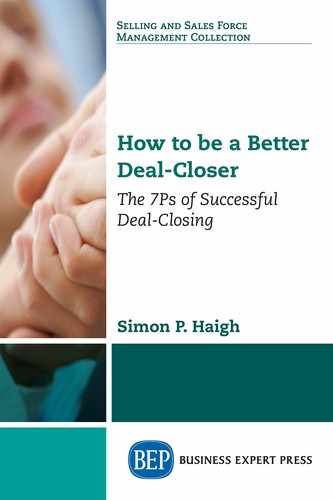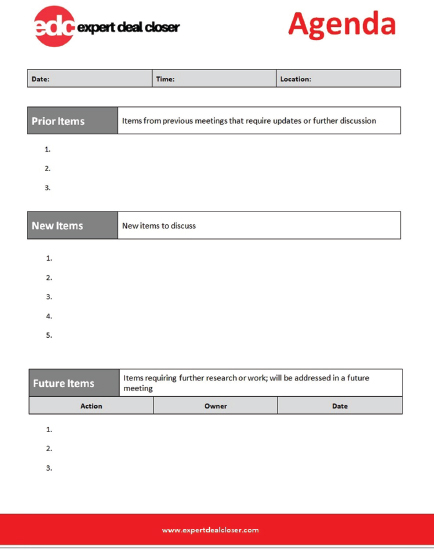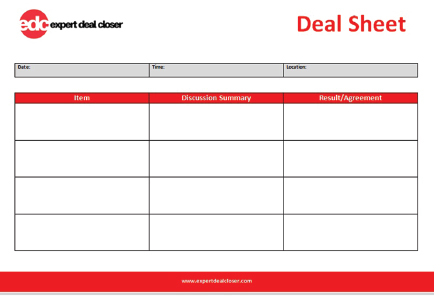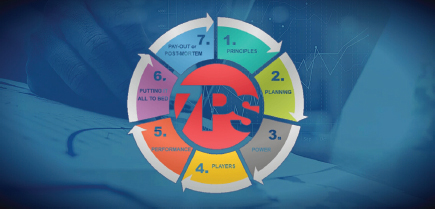
Being powerful is like being a lady. If you have to tell people you are, you aren’t.
—Former UK Prime Minister, Margaret Thatcher
This chapter demonstrates the critical importance of the power balance in deal-closing and how you can ensure you have the upper hand.
The purpose of collecting so much information can only be power.
—Author and poet, Nick Drake
In a business environment, recognized types of power include:
• Personal organizational power: Based on a person’s position within the organization’s hierarchy (though be careful not to fall into the trap of believing that lower ranking staff cannot be powerful; I have come across some very powerful executive assistants). For optimal impact this should comprise a mix of not just authority but also influence.
• Resources power: Comprised of the breadth and depth of resources at a person’s disposal (though the party with most resources at hand is not always the most powerful).
• Shared history power: Based on insights from prior interactions with the other party. Generally speaking, the more you know about the other side, the more you can plan and prepare your way to an effective strategy against them to optimize your deal (though, of course, this power is available to both parties). However, be mindful that it is possible to give away too much ground when you are too familiar with the other side.
• Informational power: Where a person has access to important or valuable information.
Information can clearly build your power. It follows that, as information underpins knowledge, converting information into knowledge produces the opportunity for even more power. Understanding the relevance and importance of information and how it can be leveraged can assist in building your power. The more you know about what is unfolding, the more you can reliably assess your position, develop your strategy, and then plan how to best execute the deal. Not only is information relevant to the inter-party dynamics, but good information management skills are also essential in corporate deals to avoid wrong decisions.
Information for information’s sake is worthless: what matters is how you apply or use the information in the context of the deal. You need the right information to help you plan and execute a deal satisfactorily. Receiving valuable or meaningful information at the right time can provide you with the power to support your most important issues. This in turn can assist you to understand what the important or primary and secondary issues are for the other side. Even the act of deciding which information to provide or withhold and how best to do this can significantly enhance the dealcloser’s position.
Information can be given through many methods, ranging from direct, unambiguous statements to gestures, suggestions, innuendos, and subtle hints.
One thing is for sure: a good deal-closer needs to consciously decide which information to give in order to provide maximum leverage to his or her deal. But, remember, information flow is not a one-way street. If you use information as power to compromise the other side, you will quickly find that other people stop sharing information with you—so you must use information responsibly.
Listen Deeply and Use Silence Strategically
When people talk, listen completely. Most people never listen.
—Author, Ernest Hemingway
Never underestimate the power of seeing things through the perspective of the other side in a deal in terms of your deal-closing strength. The best way to know what the other side wants is to ask them and then to actively listen to their response.
By using active listening skills, you can pick up hints, clues and other signals from body language, movements, volume and tone from which you ultimately may be able to assess the other side’s positioning, likely flexibility and direction. For example, if you hear “I’m hoping for …” or “Approximately …,” this weak language may suggest uncertainty and weakness. Generally, deeper and slower voices tend to project more confidence, while a variable tone is seen as more engaging than a monotone.
A good deal-closer needs to be fully present and engaged in the communication, with both body and mind actively involved. Active listening also requires you to ask questions, nod encouragement and partake in other to-and-fro activities and signals. Done the right way, you can significantly enhance your power.
Good deal-closers also use silence at strategic points in the discussion. Silence, if used the right way, can be a very powerful tool in itself. I have often found that the irresistible combination of a direct question and the subsequent discomfort of the ensuing silence can elicit an answer!
Back to the two blocked technology deals, while I was using direct, authentic face-to-face questioning to build a picture of what had transpired and to then frame a strategy to move things along I noticed some initial caginess to open up and this took quite a while to change.
Have you experienced this?
What did you do?
What did I do?
To move things along, I used active listening skills, picking up hints, clues, and other signals from what I was being told and from the other side’s body language. This then helped me to assess the other side’s positioning and, in turn, how to leverage a positive change in responses.
Networks and Relationships Increase Your Information Base and Deal Power
The richest people in the world look for and build networks; everyone else looks for work.
—Businessman and self-help writer, Robert Kiyosaki
The closer you get to knowing the intentions, desires, and assumptions of the other side in a deal, the more likely you are to ultimately get what you want from the deal. So, using networks and relationships is a very important additional way for deal-closers to gather the all-important information they need, which then enhances their knowledge and ultimately their power. This is particularly the case if the network or relationship connects you to the key decision-maker(s) on the other side.
In my experience, you are more likely to successfully execute business deals for a longer, more sustained period of time if you do so through relationships built upon mutual trust. How long it takes to build mutual trust depends on many variable factors.
Bear in mind, though, that close relationships are not very common in business deals. Also, relationships can sometimes get in the way if they hamper objectivity, leading to a less appropriate outcome. Being too close to the other side can skew a deal-closer’s judgment in that he or she may become too focused on previous conflict or pay back some past due instead of focusing on the matter at hand—closing the current deal.
Build the Appearance and Perception of Your Power
Careful planning allows you to frame your preparations for maximum effect and maximum deal power, highlighting your potential deal strengths and weaknesses and providing you with the ability to fix any holes in your position.
As with planning, do not cut corners. As a first step, conduct a comprehensive assessment of relative power between both sides. Your relative power directly impacts your ability to execute deals. In fact, relative power is one of the most important factors that can determine the outcome of a deal.
Deal power is a frame of mind and can be developed. Even if initially it looks like there is a significant imbalance of power between you and the other side, by being smart, diligent, and measured a good deal-closer can readjust that imbalance—for example, by moving the discussion away from price to quality or some other emotive subject.
Power is not static. It usually ebbs and flows during a deal and can change sides very quickly. Whether you like it or not, your power is always influenced by your credibility, legitimacy, knowledge, authority, appearance, and influence.
Perception is an extremely powerful power source in deal-closing: perceived power can be as powerful as actual power. So focus on building the appearance (or at least the perception) of your own power.
You can create, emphasize, or reinforce your power through:
• A SWOT (strengths, weaknesses, opportunities, and threats): This analysis can provide significant value in terms of identifying and improving your power-base. I regularly use this tried and tested tool with clients;
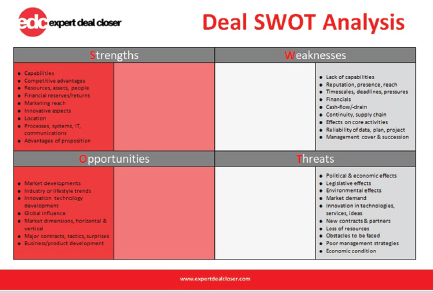
Sample SWOT Analysis
• Incentives: The weaker your position, the more you may need to focus on offering incentives to the other side to get them over the line. The more incentives you can offer that can satisfy the other side’s needs, the greater your chances of increasing your power. This is even more so when you present them as value propositions;
• Persuasion: Very powerful in helping you to achieve what you want, again especially if you use value propositions;
• Alternative strategies: The more time you spend analyzing and strategizing the costs and benefits of all the deal options, the stronger your deal position is likely to be;
• Your networks, contacts, and relationships: To give you significant information and therefore power;
• Cultural awareness: Which enables you to nimbly navigate the potential pitfalls that can arise in a deal from cultural differences.
• Finally, using a time-out at the right time in the deal process can give you more power. On the other hand, be careful of excessive time-outs from the other side, which may simply be a strategy adopted to avoid dealing with an issue—I have seen several deals jeopardized in this way.
Use an Agenda to Control the Discussion
Agendas are a good way of taking—and retaining—control of a discussion.
If you set and circulate an agenda in advance of a meeting, you effectively steer both the deal planning and the actual face-to-face discussion.
Agendas also help to prevent the other side suddenly changing tack without prior notice, as you have a record of what was agreed for discussion.
Sample Agenda
Use Deal Sheets to Reinforce Your Power
A deal sheet, a summary of deal discussions—is a valuable tool that provides a deal-closer not just with an ongoing record of the discussions (which is important in itself) but also with the space to stop, pause, and take stock of the progress of the deal journey. That space can be particularly useful when tempers and egos start rising.
A deal sheet is useful in terms of calibrating where the discussion is at, while also providing both sides with the ability to tweak and reframe their proposals as and when needed. Used the right way, deal sheets keep focus on the main issues at hand and confirm areas of agreement to date as well as outstanding action items.
Sample Deal Sheet
They are especially useful where there are many complex, yet unrelated, issues at play. Using a deal sheet to record the progress of each separate issue is a convenient way to keep track and also to ensure that you are focusing on the right issue. Also, a deal sheet is useful in calibrating whether you are falling short in any of your proposals. By compiling a deal sheet you can see how you are doing in relation to the deal as a whole—presenting all issues in a single deal sheet enables you to see in one place the overall value of your deal, which will reinforce your power-base.
Regardless of who is taking the formal minutes of the meeting, you should ensure that you keep your own notes, made at regular intervals during the discussion. Where necessary, don’t be afraid to stop the discussion to clarify your understanding of what you are recording on the deal sheet.
Organizational Cultural Robustness
Ensuring your organization itself is optimized for deal power is critically important. Some key activities that an accomplished deal-making organization can undertake include:
• Conducting effective, constantly market relevant deal-closing and/or negotiation training and follow-up support;
• Providing a collaborative, learning environment for those employees who are engaged in/involved in deal processes; and
• Monitoring deal skill development and continuous improvement.
Alan O’Neill (www.alanoneill.biz) is an internationally acclaimed change agent, speaker, columnist, and owner of Kara Change Management and has strong views about ensuring organizational cultural robustness for effective deal-closing:
The common denominator that determines the success or failure for any organization, is its culture. Vision and mission describe “why” an organization exists. Strategy outlines “what” should be done and “when.” Structure details “who” will do whatever. But it is the culture that shapes “how” things will get done.
In corporate language, culture is often defined as “the way we do things around here.” We can read the culture of an organization from how it interacts in the media, with customers, suppliers, and its own people. It is very encouraging to see huge brands like Disney attribute so much of their success to culture. They proactively define their culture and continue to embed it right across their organizations.
Within the definition of culture as “the way we do things around here.” There is a clue. Culture in essence is a combination of the behaviors of an organization’s people, the leadership style, the processes, and the rules they live by. Culture drives consistency.
A proactively defined culture impacts HR practices, engagement of an organization’s people, customer experience, marketing, all kinds of decision-making and internal controls. In other words, everything that happens in an organization is shaped by its culture. This definitely includes its deal-closing capabilities.
Culture Change Tips
As Alan O’Neill continues: every organization has a culture, whether it realises it or not. The organization may not be able to define it or even have planned for it. But it does have one. There will be elements of it that are good and elements of it that are holding the organization back.
For organizations to take charge and shape their own culture for optimal deal-closing they should:
1. Audit current culture
Conduct focus groups of staff, customers, and suppliers. Think carefully about what questions should be asked. Address the softer issues such as behaviors, processes, and leadership. Questions should be crafted to identify enablers and obstacles.
2. From the findings, carefully design an independent and anonymous employee survey
Resist the temptation of using a generic employee survey and do not select a partner just because of the software they use. Instead, engage a company that helps to ask the right questions so that you can obtain quality insights as a result.
3. The results may challenge the deal-closing organization
It is important to use the feedback and insights to design a new deal-closing culture, built on a set of values that respect the heritage of the organization’s brand, the ambition of the key stakeholders, and the changes in the organization’s environment (such as competition, customer changing needs, employee expectations, and so on).
Typical obstacles that emerge in culture audits include a lack of individual ownership and accountability, poor focus on customers, gaps in internal communications, inadequate internal collaboration, and disrespect for people.
Regardless of an organization’s size or industry, to maximize its organizational cultural robustness for effective deal-closing it needs a culture that is relevant to its business. The devil will be in the detail.
Summary
• Information and knowledge enhance your power.
• Listen deeply and use silence strategically.
• Networks and relationships increase your information base and deal power.
• Build the appearance and perception of your power.
• Use an agenda to control the discussion.
• Use deal sheets to reinforce your power.
• Organizational cultural robustness.
Kingsley Aikins
Can you give me an example of how you used your network to close a deal?
Answer:
Well, perhaps I’ll tell you a little story. Back in 1997, I was working for this organization which was headed up by Tony O’Reilly, a well-known Irish businessperson, who had been involved in South Africa. And in 1997, we had a difficult situation in Northern Ireland, so we arranged to bring all the leaders from Northern Ireland to South Africa to meet Nelson Mandela. Which they did and we spent three days. It was an extraordinary event.
We used Cyril Ramaphosa and Roelf Meyer, leaders in South Africa who brought South Africa together in 1994 and the end of apartheid. It was a really fascinating use of the connections that we had, particularly O’Reilly, through his rugby, he played for the Lions in South Africa, and all those years later was able to use these connections to bring about a negotiation. One year after those meetings in South Africa, the Good Friday Agreement in Northern Ireland was signed. And I’ve spoken to many of the leaders since who’ve said it was that experience in South Africa, which was really a clinching element of that deal.
Kingsley Aikins
Why is networking now more important than ever?
Answer:
Oh yeah, well I would say it’s more important than ever. It’s a bit like asking a barber, do I need a haircut? Of course, you know, I’m just very passionate about why networking is so important. It’s more important now than ever before, because we live in a totally interconnected, interdependent world. The world has changed quite dramatically. The old sort of career structures we had, when people joined a company, worked, got promoted, we used to call it the Escalator Model of a career, that’s all changed, that’s all fundamentally different.
You need your networks to survive and thrive. This is something, which is, although it’s always been with us, perhaps not at the same degree of momentum and trajectory as we have now. What people often don’t realize is that as they progress through their career, the technical skills they needed in the first place to get into their jobs, become less important and relationships become more important. So now you’ve got all sorts of different elements out there.
Companies now want to hire and wire: they want to hire people and wire into their network. There’s one very obvious reason why networking is more important than ever, more significant than ever, is that people who build strong and diverse networks live longer, are happier, earn more money, are more successful. So we live in a very diverse world, we live in a city here where 25 percent of the people in this city are not born in this country. We need to build diversity into our networks.
We need to build social capital as the resources available to you in your personal and business networks. We’ve got to use serendipity and luck to influence our lives. One connection can have an extraordinary effect on our lives. So, you know, I could go on about this at some length, but I just obviously, fundamentally, believe that this is going to be a key differentiating factor in this 21st century. People who’ve strong networks will be more successful.
Jeff Caselden
Tell me about a time where power was abused in a deal-closing context and led to sub-optimal outcomes for one or both sides.
Answer:
Yeah, I would certainly say that we abused our own power in this context, in some ways. We controlled the older product that this client we had was reliant upon and we were simply going to pull the plug on it, unless they wanted to own it and support it for themselves, which they lacked both the technical expertise and resourcing to manage. So, migration to this new product was honestly their best viable alternative from the initial assessments done from each side. Though I can say that once things got tough, the other side kind of leveraged their own power in counter-productive ways, which actually eroded some of the traction we were managing to gain.
The leader we were dealing with on the other side of this deal had a real tendency to escalate issues to leadership unnecessarily and would get rather rude and somewhat hostile in his dealings with myself and our team. And, I mean, he certainly had reason to be unhappy, these engagements often did more damage, though, than they did to make things better.
1. What are the main types of corporate power?
Personal organizational power: Based on a person’s position within the organization’s hierarchy; Resources power; Shared history power; and Informational power.
2. Why are listening skills so important for deal-closing?
The best way to know what the other side wants is to ask them and then to actively listen to their response. By using active listening skills, you can pick up hints, clues and other signals from body language, movements, volume, and tone from which you ultimately may be able to assess the other side’s positioning, likely flexibility and direction.
3. Why are networks and relationships so important to increase your information base and deal power?
The closer you get to knowing the intentions, desires and assumptions of the other side in a deal, the more likely you are to ultimately get what you want from the deal. Using networks and relationships is a very important additional way for deal-closers to gather the all-important information they need, which then enhances their knowledge and ultimately their power.
4. Give examples of useful ways to create, emphasize, or reinforce your deal-closing power?
SWOT; incentives; persuasion; alternative strategies; networks, contacts, and relationships; cultural awareness; using time-outs.
5. Why is a deal sheet useful?
A deal sheet is useful in terms of calibrating where the discussion is at, while also providing both sides with the ability to tweak and reframe their proposals as and when needed. Used the right way, deal sheets keep focus on the main issues at hand and confirm areas of agreement to date as well as outstanding action items.
They are especially useful where there are many complex, yet unrelated, issues at play. Also, a deal sheet is useful in calibrating whether you are falling short in any of your proposals.
